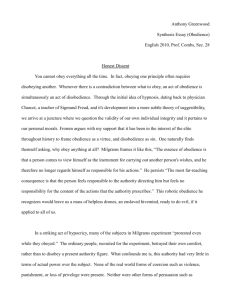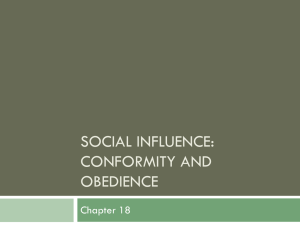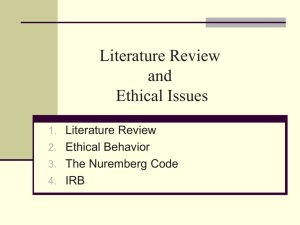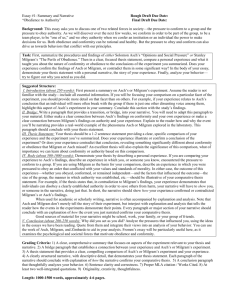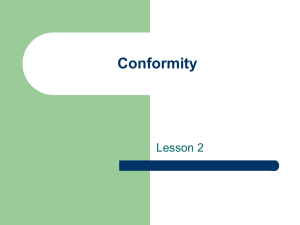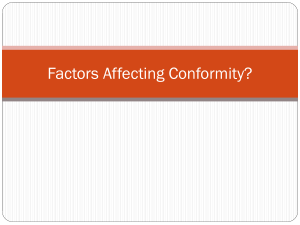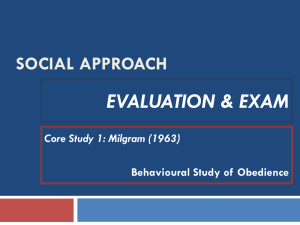Social Influence Research
advertisement
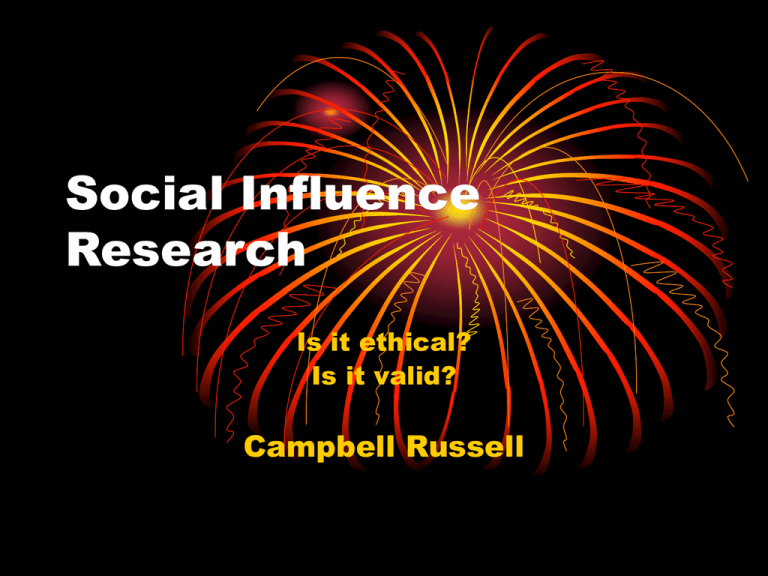
Social Influence Research Is it ethical? Is it valid? Campbell Russell The four big boys •Asch •Milgram •Zimbardo •Moscovici • Series of experiments most done with 1 participant and 5-8 confederates • Real participant would give their judgment after several confederates had already given theirs Asch • What did he do for us? • He told us the amazing fact that people will conform to a majority influence. • He “set up” individual students to conform to a majority in an unambiguous setting. Milgram • What did Milgram do for us • He gave us some shocking results! • He demonstrated just how obedient we are • He showed that obedience can be explained in a number of ways Zimbardo • What did Zimbardo do for us? • He showed us that we might all adopt roles in certain settings. • His prison simulation showed how easy it is to get “prisoners” to acquiesce and “guards” to become brutal bullies. Were they ethical? • Asch • No. He caused embarrassment to his subjects (harm) and he certainly deceived them. Were they ethical? • Milgram • Get out! Ethical? He had grown men weeping. There was deception, of course, as well. Were they ethical? • Zimbardo • Now you’re having a laugh. Let’s just think about it. There was no deception, but I think the methods might just be described as harmful! Were they justified? • Costs against benefits Were they justified? • Asch showed that conformity was not just about being led because we are not sure – an ambiguous situation. • Asch demonstrated that we conform because we want to be part of the group – that we’ll conform even if the group is wrong and we know it. This is a real insight into human behaviour. Were they justified? • Milgram showed the power of obedience • He showed us that those who obeyed in such extremes as the Nazi death camps were a bit like you and me … scary or what? Were they justified? • Zimbardo showed us the power that roles can influence on us. You might think you wouldn’t do such a thing, but Zimbardo makes you re-think this. Were they justified? •If you were asked whether you would conform to a majority that you knew was wrong, what would you do? Were they justified? • If you were asked whether you would continue to electrocute someone who was clearly in distress because you were told to continue, what would you say? • Or if you were asked how you might behave if you were a prison guard? Were they justified? • This is what Aronson did. On the Milgram question he asked his students how many would have continued to the end – not even the local psychopath was present it seems! Were they justified? • Three arguments basically • Some were, some weren’t • All were • None were Were they justified? • Think about what the research added to our understanding against the cost. • It is legitimate to argue that the benefits of Milgram – increasing our understanding of obedience (if not of the Holocaust) – outweighs the pain endured by the individuals. Anyhow we are told (by Milgram admittedly) that most said they were “glad to have taken part”. Were they justified? • And what did big Phil say about locking kids up …. • It was unethical, but there were benefits Is the research valid? • What is validity? • Does it really measure what it claims? In particular here, were the participants fooled • People sure seemed fooled! • Look at the faces of the p’s in Asch’s experiment. • In Milgram p’s sweated, had a convulsion in one case, swore at Milgram .. Was this just over-acting? Is the research valid? • Does it seem real? • Is there a problem with the setting or the “real world” context that could make the results not suitable for generalisation? • Asch’s experiment was a ‘child of our times’. (Perrin and Spencer 1980) • Does this make it invalid, or is it a warning against the culture of witch- Is the research valid? • Asch • Was he measuring conformity or how important being accepted into a group of strangers is to us? • How often are we in this situation? Simplicity and stranger argument. • We don’t have to give an opinion is real life. Is the research valid? • Milgram • Is the obedience a demand characteristic? • Were they fooled? • Is it real life? • Hofling is often quoted as showing “real life” obedience but beware. • There is cross-cultural support Is the research valid? • • • • Zimbardo What was he measuring? Everyone knew it wasn’t “real” Yet his simulation seems to have reflected the reality in many prisons Questions • Consider whether the findings from social influence research (e.g.Asch, Milgram, Zimbardo) can justify the methods used to obtain such findings. (18 marks) • Do you have to use Asch et al? • Do you need to argue it is justified or not? Questions • What does • Outline some “some” mean? criticisms of majority • Which research influence can you use? research and consider whether these • What does outline mean? are fair. (18 marks)
